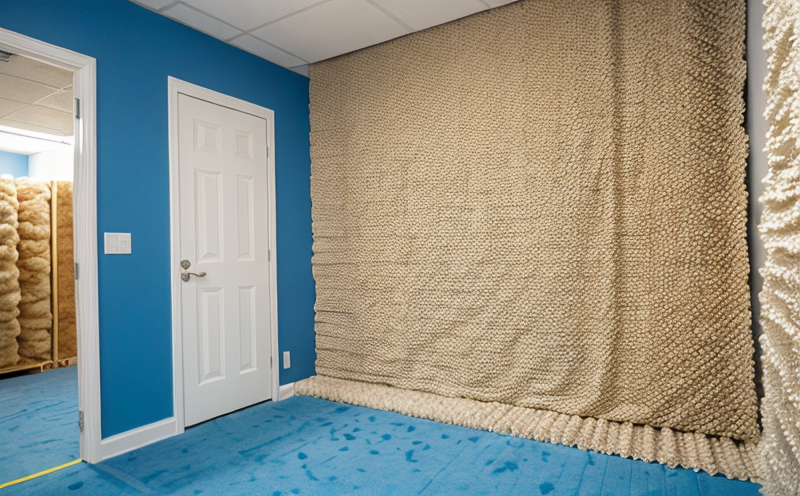ISO 140-3 Measurement of Airborne Sound Insulation in the Laboratory
The measurement of airborne sound insulation is a critical aspect within the broader scope of acoustic and noise insulation testing. This service, governed by ISO 140-3, provides detailed methods to quantify how well materials and assemblies resist the transmission of airborne sound, which is essential for ensuring the quality and compliance of building and infrastructure projects.
The process involves controlled laboratory environments where specimens are subjected to standardized acoustic stimuli. The goal is to assess the performance of partition elements under conditions that simulate real-world scenarios without the confounding factors present in a live environment. This method ensures accurate, repeatable results that can be used for quality control and compliance purposes.
The testing procedure involves several key steps: first, the preparation of test specimens according to ISO 140-3 guidelines; second, the setting up of the test setup which includes appropriate acoustic equipment such as sound generators, microphones, and measurement instruments; third, conducting the sound transmission tests using specified frequency bands and levels; and finally, analyzing and reporting the results based on the performance criteria outlined in the standard.
The importance of this service cannot be overstated. It plays a pivotal role in ensuring that building materials meet stringent acoustic standards set by various regulatory bodies worldwide. By providing precise measurements of sound insulation properties, it helps architects, engineers, and builders to make informed decisions about material selection and design optimization. Additionally, it supports compliance with international regulations aimed at reducing noise pollution and enhancing the overall comfort levels within constructed spaces.
Understanding the significance of this service also requires an appreciation for its broader implications beyond mere compliance. For instance, in densely populated urban areas where noise control is paramount, accurate measurement of sound insulation becomes crucial for effective urban planning and sustainable development practices.
- Residential Areas: Ensuring that walls and floors effectively block out external noises improves living conditions by reducing stress levels associated with constant background hums.
- Commercial Spaces: Properly designed partitions can minimize disruptive sounds from neighboring offices or retail outlets, enhancing productivity and customer satisfaction.
- Hospitals: Adequate sound insulation is vital to prevent intrusion of unwanted noise into sensitive areas like operating theatres or patient rooms, thereby maintaining the therapeutic environment necessary for recovery.
- Schools & Universities: Creating acoustically favorable classrooms and lecture halls ensures better learning outcomes by eliminating distractions caused by ambient noises.
In summary, ISO 140-3 measurement of airborne sound insulation in the laboratory is not just a technical exercise but a strategic tool for achieving optimal acoustic performance across various sectors. Its meticulous approach guarantees reliable data that can drive informed decision-making processes critical to both product development and regulatory compliance.
Eurolab Advantages
At Eurolab, we pride ourselves on delivering exceptional services that go beyond mere compliance. Our state-of-the-art laboratory facilities equipped with advanced acoustic measurement instruments ensure precise and reliable results every time.
Our team of experienced professionals brings extensive knowledge and expertise to each project they undertake. They stay updated with the latest developments in acoustics and noise insulation testing, ensuring our methodologies remain at the forefront of industry best practices.
We offer flexible service options that cater to diverse needs ranging from small scale research projects to large-scale industrial applications. With comprehensive coverage across various sectors including healthcare, education, residential, and commercial buildings, we have the capability to address any challenge related to acoustic performance.
Our commitment to quality is unwavering. We adhere strictly to international standards such as ISO 140-3 while continuously striving for continuous improvement through rigorous internal audits and feedback mechanisms from our clients.
Quality and Reliability Assurance
The quality of testing directly impacts the reliability of results. At Eurolab, we have implemented robust measures to ensure that all tests conducted adhere strictly to ISO 140-3 standards.
We employ highly trained technicians who undergo regular training programs to maintain their proficiency levels. All personnel involved in carrying out these tests are certified and follow strict protocols laid down by recognized bodies.
In addition, we maintain our equipment meticulously ensuring that it remains calibrated accurately at all times. Regular calibration checks are performed according to manufacturer recommendations as well as regulatory requirements.
Our laboratories are fully accredited and regularly undergo external audits conducted by independent assessors who verify compliance with international standards. This ensures not only consistency but also credibility of the results produced here.





